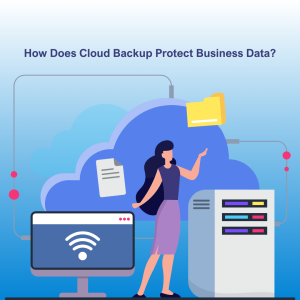A majority of businesses today rely on data for their daily operations and long-term success. However, according to recent surveys, a startling 31% of PC users have experienced data loss in the past year. The causes ranged from accidental deletion to hardware failure to security breaches. Extended downtime or permanent data loss can have devastating financial and productivity impacts on companies.
Implementing a robust backup solution should be a top priority. Traditional on-premises backups have limitations in adequacy and recoverability, while Cloud backup offers a convenient, reliable alternative that every organization should consider.
In this article, we’ll walk through 10 frequent scenarios that put data at risk and how a secure cloud backup service can save the day.
10 Common Data Disasters and How Cloud Backup Protects Your Business
- Hard Drive Failures
Hard drives have an average failure rate of around 4% annually. This can sometimes be as high as 10% or more. And consumer-grade drives don’t fare much better. Mechanical issues, crashes, bad sectors, and corruption are common causes. If the local backup resides on the same failed drive, recovery is impossible.
Cloud backup provides an independent offsite copy unaffected by local hardware problems. Backups run automatically each night, so only one day’s changes could be lost. Restores are quick and painless. Some providers even ship backup drives overnight so urgent recovery can happen immediately.
- Lost or Stolen Devices
Employees’ laptops and mobile devices frequently go missing. On average, over 2 million laptops are stolen annually in the US! Not only does this number represent a monetary loss, but also the company and customer data are now out of their control.
With a cloud service, backups happen continuously or on a set schedule in the background. So even if a device disappears for good, you can restore a recent version to a replacement. Encryption ensures data on lost devices stays secure against unauthorized access.
- Accidental Deletions
How often have you heard, “I didn’t mean to delete that!” Whether due to fatigue or carelessness, it’s a common occurrence. Workers can delete the wrong folder or empty the recycle bin thoughtlessly. Critical data can disappear instantly.
Cloud backup allows you to roll back to versions from before the mistake. You can navigate to the specific missing folders or files to initiate a restore. With on-premises solutions, recovery may be difficult or reliant on tape backups with long lead times.
- Software Failures
Today’s software is complex, which leads to pesky bugs getting through testing. Issues such as corrupted files, crashes, and errors can occur, sometimes causing permanent damage to data and files. Viruses and malware can also run rampant and may end up destroying critical data from the system. Each day, the cases of ransom attacks keep on increasing, from Crypto ransomware to Locker ransomware, among others
Since cloud backups run separately from your servers, they are isolated from any on-premises software issues. If local data becomes corrupted or encrypted, you can easily reload a clean backup copy in minutes or hours. This minimizes both data loss and productivity loss.
- Natural Disasters
Natural disasters can wreak havoc on local IT infrastructure. Fires can destroy entire data centers and displace companies permanently. Severe weather may knock out power and communications regularly.
Cloud backup vaults are typically well-protected in secure, geographically distributed data centers. So physical damage to your office or neighborhood is unlikely to affect your backups. Features like automatic server failover provide resilience. Offsite access enables continuity.
- Power Outages
On average, businesses face over 100 hours of power outages per year. Short disruptions cause production halts and equipment damage. Prolonged events due to storms or grid failure can be catastrophic. And generators and UPS systems are limited in capacity.
Since cloud platforms rely on huge redundant power sources across multiple regions, your backups will stay accessible and regularly updated regardless of local power reliability. For on-premises hardware, comprehensive cloud backup provides insurance against the inevitable.
- Data Corruption
Things can go haywire during migrations, software upgrades, system syncing, and even routine operations. Issues such as memory leaks, unexpected reboots, and flaky network connections can take a toll on the systems. Before you know it, data has become garbled and unusable. Repairing already corrupted databases and files is difficult.
Cloud services apply checksums and encryption to verify the validity and prevent the decay of local files. Multi-layered redundancies ensure no single points of failure. Frequent backups limit potential data loss windows. With cloud-based availability, restoring pristine data rapidly is straightforward.
- Hardware Damage
On top of outright failure, hardware succumbs to environmental threats more often. Causes such as condensation, power surges, electrical issues, and static discharge can fry electronics randomly. Also, accidental spills on devices can occur despite policies being in place to prevent them eg, dropped laptops, torn cables, and faulty batteries bring more havoc.
By design, cloud platforms utilize shared resources and commodity hardware that tolerates minor faults with massive redundancy procedures built in. Services continue uninterrupted through routine component replacements and upgrades. Your data stays safe and accessible since it isn’t tied to specific physical servers onsite.
- Security Breaches
Hackers and malware lurk everywhere online, probing for vulnerabilities and opportunities. For example, Phishing scams trick employees into revealing passwords or other sensitive data and material that can the m be used to launch to manage other attacks. Without multilayered security and vigilance, it’s incredibly difficult to keep intruders totally out of systems.
Reputable cloud backup providers invest heavily in state-of-the-art security including encryption, anomaly detection, access controls, two-factor authentication, and cyber insurance that maintain a resilient defense. They stay on top of threats globally and comply with rigorous standards. You reap major benefits beyond your scale.
- Human Errors
Despite the best efforts and practices, mistakes do happen. Administrators may overwrite key files or previous versions unintentionally and set up improper configurations that may cause systematic issues or failures to validate backup integrity which may open gaps for more system vulnerabilities.
Cloud backup services work to remove reliability pressure from the local IT staff. Experts design and constantly tune the systems for fault tolerance and easy scalability. Automation can ensure consistency while reducing opportunities for human oversight or errors, or implement a robust monitoring network that provides early warning of problems the systems may encounter during data backups. It is important to offer key training that focuses on staff expertise appropriately.
Keep Your Data Safe with Cloud Backups
Despite the best efforts, the above examples illustrate how susceptible local infrastructure and operations can be. Cloud backup services substantially protect against scenarios that can result in data loss and threaten your businesses. Instead of sinking costs into fragile on-premises systems, leverage the purpose-built reliability of cloud experts cost-effectively.
Contact us today for a free consultation and trial of our secure automated cloud backup service. We can assess your risk factors and design a tailored solution.




